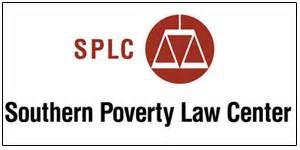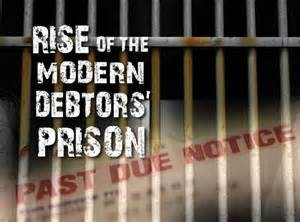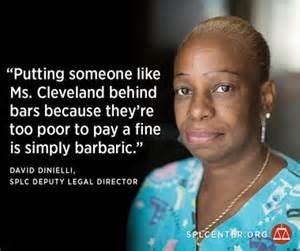Southern Poverty Law Center Takes On Alabama’s Debtors’ Prisons
Though Banned by the US Constitution, Debtors’ Prisons Are Making a Comeback in Certain States
Conjure up a visual of a debtors’ prison, and you’re likely to see a 19th century fortress filled to the brim with destitute, indigent men. It might look something like this:
Indeed, debtors’ prison thrived in Western Europe from the Middle Ages through the 19th century. It was simply the customary way to deal with unpaid debt.
In this country, the 14th amendment to the US Constitution explicitly prohibits incarceration as a punishment for indigence. Case law has either strengthened or diminished the spirit of the 14th amendment over the years. But in 1983, the US Supreme Court fortified the principle of equal protection under the law in a resounding (and surprising) unanimous decision.
Bearden v. Georgia
The case was Bearden v. Georgia. A first offender charged with theft in a Georgia court, Mr. Bearden was sentenced to fines totally $750, with $100 payable on that day, and an unwieldy schedule of payments to follow. Mr. Bearden borrowed money for the first two payments, but then he was laid off from his job. He notified the Georgia probation office that his financial plight would result in late payments. The state of Georgia accordingly revoked Mr. Bearden’s probation and sentenced him to prison.
The Supreme Court ruled that an authority may not imprison a person solely because he or she lacked the financial resources to make payment. Writing for the unanimous majority, Justice Sandra Day O’Connor asserted,
The State may not use as the sole justification for imprisonment the poverty or inability of the probationer to pay the fine and to make restitution if he has demonstrated sufficient bona fide effort to do so.
While there are no more brick and mortar debtors’ prisons, several states have found ways to circumvent federal law. In an article I recently posted on this website titled, “Nickeled and Dimed in Saint Loo,” I described how authorities in St. Louis County, Missouri, routinely use the threat of imprisonment to extort outrageous fines and court costs for traffic violations or routine offenses such a jaywalking.
This has devastating consequences on folks whose only real crime is being poor. Lacking the bucks to make proper payments…having to sometimes choose between paying fines or buying food or medicine…seeing their job prospects and credit ratings diminish…these folks remain tethered to a criminal justice system that is interested only in their meager installments. It is similar to the “payday loan” scam, except these people live with the persistent threat of being sent to prison. It is outrageous. Will someone please help these people?
Southern Poverty Law Center
Founded in 1971 by attorneys Morris Dees and Joseph Levin, Jr. as a civil rights organization, the Southern Poverty Law Center is located in Montgomery, Alabama…right smack “in the belly of the beast.” You might have heard about SPLC for its documenting and litigating against white supremacists and other “hate groups.”
SPLC’s battle against violent and unhinged people and organizations has led to some scary occurrences. In July, 1983, the SPLC’s office was firebombed, destroying the building and important documents. Two years later, a member of the KKK and a confederate pled guilty to the bombing. In 1984, Morris Dees was targeted for assassination by The Order, a white supremacist group.
In 1987, members of the White Patriot Party, and offshoot of the Klan, were charged for stealing military weaponry in a plot to murder Dees. In 1998, three white supremacists were busted for plotting a nationwide campaign of assassinations and bombings, targeting, among other civil rights activists, Morris Dees.
Sweet Home Alabama
Aside from battling hate groups, the SPLC’s public interest litigation goes to bat for people who are systematically preyed upon by Southern authorities. In Montgomery, Alabama’s state capital, a typical municipal courtroom, before SPLC came on the scene, often looked like this:
A handful of men entered the courtroom. Handcuffed and shackled, they shuffled to a long bench and sat down. One by one, they were called before the municipal judge. None was appointed an attorney. Most had been arrested for warrants relating to unpaid traffic tickets. The judge asked if they had any money to pay the balance. Most didn’t. When they couldn’t pay, [the judge] sentenced them to jail to serve out their fines–one day for every $50.
Montgomery was essentially operating a modern-day debtors’ prison, incarcerating low-income people without asking them about their ability to pay or providing them with defense counsel. The court violated our Constitution and every reasonable standard of human decency.
The woman pictured above, Harriet Cleveland, a 50-year-old grandmother, probably didn’t know that she would become the “Rosa Parks” of one modern-day discrimination struggle. For unpaid traffic fines and court costs, Cleveland’s monthly payment was $140…a heavy burden for a day care worker scraping to get by. What Cleveland didn’t know was that, of the $140 she tried mightily to pay monthly, $40 was pocketed by the Judicial Correction Services (JCS), a for- profit company hired by the Montgomery, Alabama, to “supervise” probationers such as Cleveland.
Harriet Cleveland lost her job and soon a notice came in the mail: Pay the court $2,714 or go to jail. Officers arrived to arrest Cleveland while she was babysitting her grandson. A judge sentenced her to 31 day in jail.
SPLC Files a Lawsuit
SPLC lawyers were able to get Cleveland released after 10 days. The SPLC filed a lawsuit on her behalf, claiming that the practices of the Montgomery municipal court were unconstitutional. Montgomery waved a white flag. A settlement was reached between the city and SPLC. Key provisions were:
- Montgomery will determine whether a defendant is indigent, and will not jail anyone who doesn’t have the ability to pay.
- Defendants will be given the option of performing community service until their debt is paid.
- The city decided not to renew it contract with JCS, which closed its Montgomery office.
Justice is sweet.
Coda
On March 12, 2015, the Southern Poverty Law Center in Clanton, Alabama, filed a federal lawsuit charging JCS with extortion and racketeering under the Racketeer Influenced and Corrupt Organizations (RICO) Act. The alleged violations were the same: Threatening destitute Alabama citizens will jail time–debtors’ prison–for falling behind in their payments.
“Judicial Correction Services is extorting people for its own profit,” said Sam Brooke, a staff attorney for SPLC. The RICO Act, long used to take down the Mafia and other organized crime outfits, is a new arrow in SPLC’s quiver to fight discrimination.
The symbolism is quite fitting: Debtors’ prisons…organized crime. And so the struggle continues.























































































































